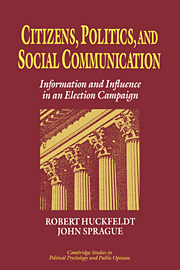Book contents
- Frontmatter
- Contents
- Acknowledgments
- I Democratic politics and social communication
- II Electoral dynamics and social communication
- III Networks, political discussants, and social communication
- 6 Political discussion in an election campaign
- 7 Networks in context: The social flow of political information
- 8 Choice, social structure, and the informational coercion of minorities
- 9 Discussant effects on vote choice: Intimacy, structure, and interdependence
- 10 Gender effects on political discussion: The political networks of men and women
- IV The organizational locus of social communication
- Bibliography
- Index
7 - Networks in context: The social flow of political information
Published online by Cambridge University Press: 22 March 2010
- Frontmatter
- Contents
- Acknowledgments
- I Democratic politics and social communication
- II Electoral dynamics and social communication
- III Networks, political discussants, and social communication
- 6 Political discussion in an election campaign
- 7 Networks in context: The social flow of political information
- 8 Choice, social structure, and the informational coercion of minorities
- 9 Discussant effects on vote choice: Intimacy, structure, and interdependence
- 10 Gender effects on political discussion: The political networks of men and women
- IV The organizational locus of social communication
- Bibliography
- Index
Summary
This chapter examines the social transmission of political information as it is affected both by individual political preference and the distribution of political preferences surrounding the individual. We address several questions. First, to what extent do individuals purposefully construct informational networks corresponding to their own political preferences, and to what extent do they selectively misperceive socially supplied political information? Second, how are these individual-level processes conditioned by constraints that arise due to the distribution of political preferences in the social context? In other words, to what extent is individual control over socially supplied political information partial and incomplete? In answering these questions we argue that information transmitting processes interact with the social context in a manner that favors partisan majorities while undermining minorities.
Politics is a social activity, imbedded within structured patterns of social interaction. Political information is not only conveyed through speeches and media reports but also through a variety of informal social mechanisms: political discussions on the job or on the street, campaign buttons on a co-worker's shirt, even casual remarks. Such political information is not processed and integrated by isolated individuals but rather by interdependent individuals who conduct their day-to-day activities in socially structured ways – individuals who send and receive distinctive interpretations of political events in a repetitive process of social interaction. Thus political behavior may be understood in terms of individuals who are tied together by, and located within, networks, groups, and other social formations that largely determine their opportunities for the exchange of meaningful political information (Eulau 1986).
- Type
- Chapter
- Information
- Citizens, Politics and Social CommunicationInformation and Influence in an Election Campaign, pp. 124 - 145Publisher: Cambridge University PressPrint publication year: 1995



